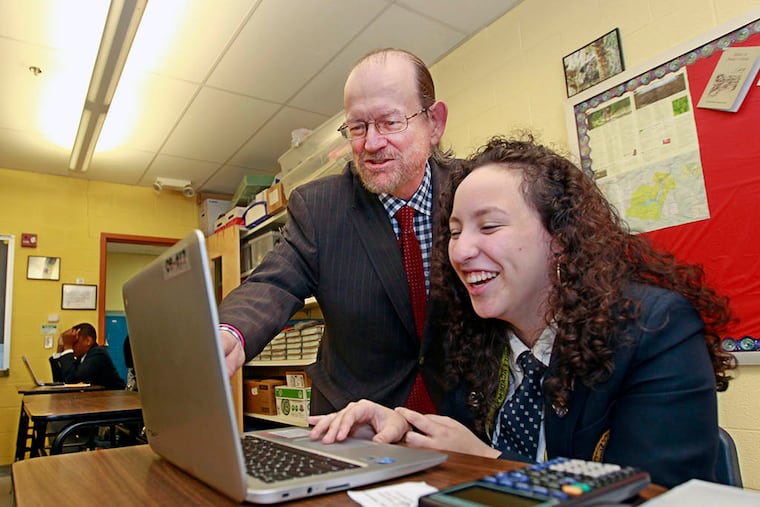A victory for Community Academy, at least for now
For more than four years, Community Academy of Philadelphia Charter School fought to stay open in the face of complaints about shaky finances and low test scores.

For more than four years, Community Academy of Philadelphia Charter School fought to stay open in the face of complaints about shaky finances and low test scores.
But the K-12 school in Kensington won a major victory last week when the state Charter Appeal Board overturned the School Reform Commission's verdict and told the commission to renew the school's operating agreement.
From Community Academy's point of view, the lengthy battle with the SRC - while expensive and difficult - showed some of the strengths of the state charter law.
"I ultimately think that the system worked in this case, because the [appeal] board and its members viewed Community Academy not just through the lens of their PSSA statistics but the school as a whole, the education they are providing, and the students they're seeking to serve," said David P. Heim, Community Academy's lawyer.
"From the very beginning, we have believed that we would prevail, because Community Academy is a good school with a solid reputation in the community," said Joseph H. Proietta, Community Academy's founder and chief executive.
To others, though, the outcome exposes the shortcomings in a law that allowed a school to stay open that should have been closed years ago.
Lisa Haver, a retired teacher and a founder of the Alliance for Philadelphia Public Schools, said the results in Community Academy's case show how state law favors charters over traditional schools.
"It goes on for years and years, and finally the SRC makes a decision, and an unknown group of people who are not responsible to the people of Philadelphia say, 'OK, no problem,' " Haver said.
In contrast, she said, "you can just close a public school in Philadelphia."
She pointed to the SRC's recent decision to suspend part of the state school code so it could vote on closing Kensington Urban Education Academy in three months.
Community, which opened in 1997, was one of the city's first charters. The K-12 school at 1100 E. Erie Ave. has 1,200 students.
After a hearing, the SRC voted, 4-0, in October 2013 not to renew the school's charter because of low test scores and concerns about its financial management.
The school took its case to the Charter Appeal Board, which voted, 4-3, on April 28 to overturn the SRC's decision and directed the commission to renew the school's charter for five years.
Among other things, Community Academy argued that its test scores had improved and that its students scored higher than those in district schools in their neighborhoods.
A district spokeswoman declined to comment on the state board's decision or say whether the SRC would appeal it to Commonwealth Court.
Even if the SRC does not appeal, the state board's ruling will not end Community Academy's battles.
The school had been in legal limbo since June 2011, when the SRC - for a second time - split on renewing the charter, by a vote of 2-1-1.
Two members of the commission at that time, Denise McGregor Armbrister and Johnny Irizarry, voted to renew the charter. Joseph A. Dworetzky voted against. Robert L. Archie Jr., then the SRC chair, abstained because, he said, his law firm had done work for the school.
The district's law department maintained that Community did not win renewal because three yes votes on the five-member commission were necessary, even though one of the seats was vacant.
Heim said the school's position was that its charter had been renewed in 2011 because a majority of the quorum had voted yes.
The dispute over those two votes is making its way through the courts.
Proietta counts the appeal board's decision as a major victory for Community, which hailed the decision on Twitter.
"We've celebrated quietly, internally," Proietta said.
He said the long process and the cloud over the school's future had hurt morale, causing some teachers to leave and draining resources from the academic program to pay the legal bills.
"It seems to me," he added, "that the only people who profited from this are the lawyers."
Proietta also said that during the four years, the SRC had changed and so had the district's administration.
"Not a single member of the SRC right now was on the SRC when the process started," he said. "And the only person who is still in the charter office is the secretary."
And because of the unique circumstances surrounding Community Academy's battle with the SRC, Heim said, the school will not know what period the renewal covers until the Charter Appeals Board releases its final order his month.
"Community is going to get a five-year charter," Heim said. "That is what we definitely know. But when that charter begins and ends is not yet known and may be a subject of some discussion."
Under one scenario, the school could be up for renewal again in the fall.